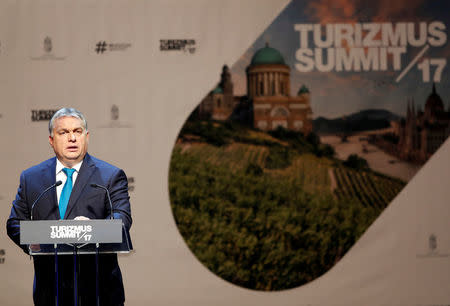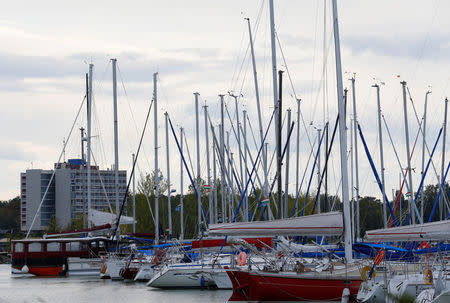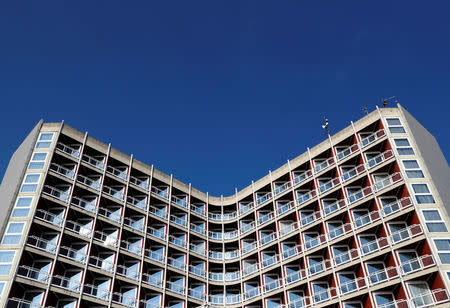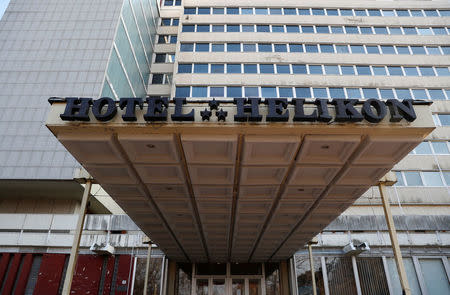Special Report: How Europe's taxpayers will bankroll Viktor Orban's friends and family
By Marton Dunai
KESZTHELY, Hungary (Reuters) - In a corner of Lake Balaton, central Europe's largest body of freshwater, the rocky shoreline leads to a leafy park at the city of Keszthely, a resort whose natural beauty contrasts with the dereliction of its hotels.
Keszthely used to be a magnet for Communist-era workers and apparatchiks before the fall of the Berlin Wall in 1989. Now, to the delight of many locals, the dilapidated waterfront is set for an investment bonanza. But the scheme is controversial. The reason: the people who stand to profit from it. In Keszthely, Reuters has found, those first in line to capitalise are Prime Minister Viktor Orban's friends and family.
Orban has earmarked more than $3 billion in public funds for tourism ventures across Hungary up to 2030, including more than $1.4 billion for Balaton, according to government announcements since March 2014. Most of the cash will come from Hungarian taxpayers. About 40 percent of the money for Balaton will come from the European Union, which gives funds to members to help lagging regions grow.
"This kind of money has not come to Balaton in all the years since the end of Communism combined," said Henrik Hoffmann, chairman of a Balaton regional tourism association.
Since 2014, when the prime minister first mooted the prospect of investment, the seven most prominent waterfront properties in Keszthely have changed hands. An analysis of publicly available data shows three of them are now owned by Orban's childhood friend Lorinc Meszaros and his business partners, and another three by Orban's son-in-law Istvan Tiborcz and his associates. Reuters has also found company documents that show a company co-owned by Orban's son-in-law Tiborcz stands to collect almost half of any profits from a venture which acquired the resort's biggest hotel.
Neither Tiborcz or Meszaros responded to requests for comment.
Meszaros and Tiborcz are part of a Hungarian elite which has grown fast over the past eight years, acquiring stakes in major industries like banking, energy, construction, agriculture and the media, as well as tourism. In all, 10 individuals have significant stakes in the Keszthely developments. Most of them have become heavyweights in the broad economy: Companies they control have participated in winning bids for public procurement contracts, some of them funded by the EU, worth nearly $8 billion since Orban resumed power in 2010, according to a Reuters analysis of data collected by the Corruption Research Centre Budapest, a think tank, from the Public Procurement Authority.
That is more than 10 percent of the value of such contracts over that time. Last year was a bumper one for public procurement tenders: More than $14 billion were awarded, and companies controlled by men with interests on the Keszthely waterfront won just over $4 billion of them - more than one dollar in every four.
Neither Orban or the government responded to requests for comment.
The European Union's anti-fraud office (Office européen de lutte antifraude or OLAF), has recommended that Brussels ask Hungary to repay EU funds totalling more than 4 percent of the cash Europe has given it between 2012 and 2015. OLAF declined to discuss specific projects, but says on its website it makes such recommendations when it believes EU money has been "defrauded or irregularly misspent." Suspected violations can include projects that have been overpriced, involved collusion with bidders, or pointed to conflicts of interest. Hungary's suspect total, according to OLAF's 2016 annual report, is a bigger share than that of any other EU state, amounting to about 850 million euros ($1 billion) of funds.
In January, OLAF recommended that Hungary take legal action over what it called "serious irregularities" in the award of contracts to Tiborcz and an associate, Endre Hamar, for a street lighting project. In that project, a company owned by Hamar was the adviser on tenders that another Tiborcz and Hamar firm went on to win. Neither man has commented on OLAF's findings.
OLAF has no power to police member states, and can only recommend steps for the European Union or national authorities to take. The EU has "zero tolerance to fraud with EU funds and therefore insists on a clear commitment from all member states to prevent fraud," a Commission spokesperson said by email. The spokesperson did not respond directly to Reuters findings, or say what if any funds have been recovered from Hungary. The European Commission also carries out its own audits, blocks payments when it suspects an irregularity and claws back the expenditure if the irregularity is confirmed. But this work is not made public.
Orban's party, Fidesz, has ruled Keszthely for more than a decade, and polls show he is set for victory in a national election this April. He has long defied oversight by what he calls the "global political overlords" and "liberal elites" and portrays himself as a pioneer among eastern European leaders whose countries are part of the European Union, but who rebel - in his case by saying Hungary deserves the bloc's cash in exchange for opening up its markets, and that he should be free to form his own class of loyal industrialists.
"What some call corruption is essentially the main policy of Fidesz," Andras Lanczi, an Orban supporter at the think tank Szazadveg, said in a 2015 newspaper interview that Szazadveg put up on its website. "By that I mean the government has set goals like forming a layer of domestic businessmen, building pillars of a strong Hungary in rural areas or in industry."
Orban and his associates have a clear system, said Peter Kreko, chief analyst at the Political Capital think tank in Budapest: They build positions in sectors and prepare for the arrival of public funds. "Close associates of the prime minister get fat on state money," he said.
"NATIONAL COOPERATION"
Outside Hungary, Orban, the country's longest-serving leader since Communist times, makes headlines for what he rejects. He helped banish Communism, but he also went on to flout European policy by refusing to house refugees. He cut short cooperation with the International Monetary Fund and boosted taxes on foreign banks and multinational corporations.
Less widely known is that eight years ago, he introduced an economic doctrine which he called a revolt against international capital and liberal values. It is geared to affirming the supremacy of nationalist-minded people, a vogue that has spread across eastern Europe.
"We were among the first, or maybe the first, to revolt in 2010," Orban said in his state of the nation address last year. "In seven years of hard work we built our own political and economic system, a Hungarian model tailor made for us... the System of National Cooperation." He told a gathering of friendly intellectuals in 2013 that this involves nurturing a supportive moneyed class: "The system cannot work without international capital. But... Hungarian national capital must be empowered as well."
Since 2010, Hungary's economy has grown by about 2 percent a year on average and tourism in Balaton has grown even faster. But Keszthely's tally of 165,000 overnight stays in 2014 slipped to about 135,000 per year, on average, in 2015 and 2016, according to Hungary's Central Statistics Office.
The month before Hungary's 2014 election, Orban attended a conference of tourism professionals in another town on the Balaton shore. He told them the government had a plan, based on "sketches on the canvas," to inject development funds totaling about $1.1 billion in tourism - plus extra funds for Balaton. He did not say then where the money would come from.
WESTERN HARBOUR
That June, after Orban had been re-elected, his daughter Rahel's husband, Istvan Tiborcz, set up a company, Western Basin Harbour Development, with partners including Tiborcz's old school friend Hamar, who is a lawyer. It went on to acquire the rights to the Keszthely Yacht Club from the city.
The agreement, sealed in December 2014, divided the sale into three parts and included an option rather than a cash sale. This structure meant that even though the arrangement obliged the buyer to pay more than $1 million for the buildings, each element of the deal's value was below the $100,000 threshold that would require the contract be put out to tender.
There was a flurry of controversy with headlines such as "Tiborcz buys marina for Christmas" in the press. But after an investigation, the regional prosecutor said there was nothing illegal about the arrangement.
"We sold an unprofitable harbour at a decent price," said Keszthely's former deputy mayor, Robert Palinkas, rejecting any suggestion of wrongdoing. "This was not an area that was marketable immediately and unconditionally. Maybe there were no other investors because they had to commit to serious undertakings there."
Tiborcz quit as a partner in the Yacht Club in March 2015. The marina's main owner, Krisztian Lukacs, told Reuters this was a response to the controversy about his purchase. Tiborcz did not respond.
An old friend of Tiborcz stayed as CEO at the club. Zsolt Peter, who has lived in Keszthely since 2000, said his family had been close to the Tiborczs for three generations. The new owners gave the marina a facelift, installed a chic new restaurant and worked on marketing. Peter said that at the close of season last year, 130 boats moored there - up from 67 when he took over and just shy of breakeven, which he put at 150 boats.
But Tiborcz's interest in Keszthely did not end when he quit the Yacht Club. By far the biggest hotel on the waterfront, and the one in the best condition, is the boxy concrete structure of the Hotel Helikon, recently closed down for redevelopment. Behind the Helikon's grimy windows on a January visit, a billiard table stood with a lone cue propped up against it.
The site was bought in December 2016 by a new company called Pannon Tessera Hospitalis, or PTH. In its first year, PTH was owned and operated by a veteran hotel manager called Zoltan Somlyai. It had zero revenue and he said he was its only employee. Company documents showed 90 percent of profits were to be paid to an undisclosed holder of preference shares.
According to fresh company documents filed last month, a company owned by Tiborcz and Hamar owns preference shares in PTH. These entitle the holder to 45 percent of any profits it makes. The rest of the profit now goes to a Tiborcz associate called Attila Paar, who bought a stake last year through a company he owns, and a another investor, a lawyer who is largely unknown in the tourism industry.
Tiborcz, Hamar and Paar did not respond to requests for comment.
On a windswept weekday in late January, 70-year-old Gyorgy Horvath, fishing on the refurbished marina jetty, said he was more than happy with the plans to revamp the waterfront. He served at tables for 35 years as a waiter in the Helikon: He remembered when busloads of visitors came, in winter and in summer, year after year.
"Keszthely has great potential," Horvath said. "I really don't care who builds stuff, and I don't care about politics. ... Just start something worthwhile already."
"FLOWERS FOR HUNGARY"
Back in 2015, Orban's "sketches on the canvas" were still vague. There was, say people involved in Hungary's tourism industry, confusion over what to expect from the government, either in the marketing strategy or the funding. The government launched one plan in November but withdrew it six months later.
In April 2016, the government centralised the administration of Hungary's tourism industry in the Hungarian Tourism Agency (MTU). This entity, it said in a decree last March, designs and implements tourism programmes, including those to be funded by EU money from 2014 to 2020. The MTU does everything from outlining strategy and assigning state funding down to organising events such as the "Flowers for Hungary" programme, a contest for the prettiest environment.
Orban's ministerial office took a similar centralising step in 2014 when it absorbed the National Development Agency, which allocates EU funding in Hungary.
Orban's daughter, Rahel, played a role in the changes, such as formulating the tourism marketing strategy. Then 27, she had studied tourism and graduated with an Executive MBA in hospitality management at the private Ecole Hotelière de Lausanne in Switzerland, which educates some of the best tourism managers in the world.
Eight current and former tourism and government insiders told Reuters that Rahel Orban is highly influential in the tourist trade and works closely with the MTU's CEO, Zoltan Guller. The MTU said Guller had "occasionally sought Rahel Orban's opinion about shaping the Hungary brand," and that she is not paid for this work.
When asked if she influences decisions on funding, it did not respond. She did not respond.
GOLDEN TOUCH
Even before Rahel Orban had helped clarify Hungary's strategy, others in the prime minister's circle joined the Keszthely shopping spree. In April 2015, a businessman named Gellert Jaszai made a purchase that paved the way for Orban's childhood friend Lorinc Meszaros.
Jaszai bought into a small holding company called Konzum, a former retail chain operator that had sunk to a penny stock. A year later, Konzum bought a real estate fund that included two Keszthely hotels and the rights to a company which operates a lakeside campsite. In February 2017, Meszaros announced on the stock exchange that he had bought 19.6 percent of Konzum.
Meszaros acquired dozens of properties elsewhere around the lake, which he incorporated into Konzum. Jaszai said he had known Meszaros for a long time.
A pipe-fitter and mayor of Orban's hometown, Meszaros is one of Hungary's most influential businessmen, famed nationally for attributing his rise to "God, good fortune, and Viktor Orban." His interests span well over 100 companies in seven major industries from construction and real estate to energy, media, banking, finance, tourism, sports, and agriculture.
Today, Konzum is one of four publicly traded companies in which Meszaros and Jaszai hold stakes. Its shares rose 5,300 percent last year, in anticipation of business success in ventures from tourism to energy.
"It's difficult to put a ceiling on the valuation," wrote stock analyst Gellert Gaal from Concorde, a prominent Hungarian brokerage, in December - a view he said in March he still held. "Investors have extreme faith in the profit growth of these companies, as if everything these companies touch turned into gold."
In addition to renovated hotels, the Balaton area now is promised improved road, rail, air and water infrastructure, including a $670 million motorway, upgraded adventure parks, and a central state marketing effort around the Balaton brand.
Gyorgy Wossala, a 77-year-old Balaton hotel manager who sold a hotel up the lake to Meszaros in 2016, said he chose Meszaros from a half dozen competing bidders solely because Orban's old friend offered the best price. He would not say what it was.
"He probably sees the opportunity in Balaton," Wossala said, sucking on a pipe on the patio of his lakeside home. "Everyone who can is building positions now," he added, referring to the government's planned cash injection in tourism.
"Everyone sees these billions. ... And of course, people with good government ties have always received their subsidy before those without."
(Edited by Sara Ledwith and Richard Woods)





